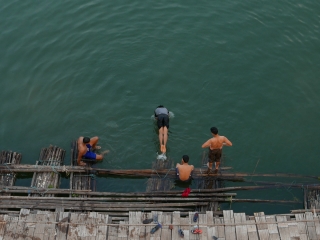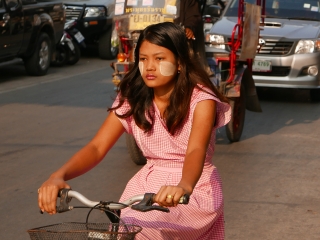On my final evening in Sangkhlaburi, I pay a visit to Jimmy, and American expat who has lived in Thailand for more than 30 years, quite renowned in the region for his humor and advice. “They all come to me on their last evening and then regret it,” he welcomes me. His restaurant stands out among the tourist traps on Sangkhlaburi’s main street because of the many book shelves and a CRT television playing pop-rock concerts round the clock. As I sit down, Jimmy puts on an Amy Winehouse concert and asks his Burmese wife to prepare a traditional curry dish for me. “Not too spicy,” he adds.
There are people whose life is one jaw-dropping story. And there is Jimmy, whose life is a magnum opus of jaw-dropping stories. These stories unravel from one another, ignore any chronology and questions, and mix with jokes that Jimmy makes with his clients, so it is impossible to give a straightforward account of his life. It can start anywhere, for example with Jimmy’s golden era of beach life during the 80s. Thailand was still mostly unexplored by Westerners, a haven for adventurers and free spirits. Jimmy had decided to remain in the country after being on a US air force mission to thwart Burmese invasions. Many great women dot the landscape of those years (he likes to rank them according to how well they cooked), but what truly stands out is the macaque that Jimmy saved from a beach photographer and that later became his partner in crime.
The monkey learned to listen to the sound of rolling dice and could tell how the dice had landed. It communicated the number to Jimmy by tapping on his shoe during games of blind dice rolling, which got them a small fortune—until the other players were onto them and banned the monkey from showing up again. One other time when Jimmy had no money to buy booze, the monkey sympathized with his misery and took out some 5-baht coins that it had randomly found and stashed in its gums. Jimmy relates the monkey’s ingenuity to that of the great clan of monkeys which, according to legend, saved the Thai people when they were driven into the waters by a Burmese invasion centuries ago. The monkeys built a bridge by clinging to one another and thus helped the Thais to the other shore. All I can comment to Jimmy’s endless glorification of monkeys is that these creatures make good stories in my experience too.
The entire evening he leaps back and forth between such episodes, and pauses only to praise Amy Winehouse or to tease his wife. There’s five of us at the restaurant and we listen to him in a state of awe, because Jimmy has lived enough to fill more than five lives—and probably more than five books (when I asked him, Jimmy said he is still waiting for the right person to write his biography). And like many a great adventurers, Jimmy also has a story about finding a new purpose in life after a near-death experience.
Some years ago in Kanchanaburi (a major town in the region), Jimmy was hit in the head by someone who probably meant to kill him. He thought he wouldn’t survive the blow and was blind and incapacitated for a few years after. The recovery was very slow, but his health and strength were eventually restored, and he believes it was for one purpose: to tell the world about soursop, a tropical fruit believed to kill certain cancer cells. He now promotes soursop by acting as a link between locals harvesting soursop and US distributors, and wishes he had only found out about the fruit sooner, before he lost some of his friends to cancer.
“90% of today’s drugs are obtained from jungle plants,” remarks a medicine student at the next table.
“Yeah, see, that’s what I’m talking about. But the jungle also brings disease,” and Jimmy begins to list everything he and his wife have suffered from since living here in Sangkhlaburi, close to the jungle.
“I am planning to travel deeper into the jungle…”, I say a bit concerned, fishing for some advice.
“Where to?”, asks Jimmy.
“Um Phang.”
…and the conversation takes a different turn.
“It’s almost two days by bus if you take the normal road, but the people here know a 4WD road that cuts straight through the jungle and they use it frequently in the dry season and it will get you there in about four hours. I can talk to one of them to take you along.”
I get carried away by this prospect and how great it sounds, so I tell Jimmy I am definitely in.
“So if you come here tomorrow morning after 7 we can go to the market together and I can get you on one of those trucks. You might get into Burma for parts of the road, so have your passport ready. Don’t worry, the people here know me well and will take care of you and it’s a trip that you will remember for the rest of your life.”
By now, Amy is done with the singing and Jimmy is already at his fifth or sixth beer. His wife is signaling that it is time to close for the day. I go home completely excited about the adventure ahead and have a hard time falling asleep, playing various scenarios in my head for the rest of the night.
The following morning I am back at Jimmy’s at 7:30, with all my belongings and enthusiasm. But the place is disappointingly closed, no sign of Jimmy or his Burmese wife. It looks like my ‘adventure’ ends here and I will have to take the good old 8 o’clock bus out of town. To soothe my regret, I tell myself that Jimmy’s eventful life was possible thanks to Thailand’s unknownness a few decades ago; in that era, hardy souls, eager for discoveries, came here to lead a life outside the norms and expectations of the West, which eventually made for great story material. Would someone nowadays, given the same backdrop, experience adventure the same way as Jimmy (doing things the rough way, discovering something new to the West, going where few have been)? By now, Thailand has been walked, driven through, flown over, or GPS-mapped in almost all directions.* With excellent phone coverage everywhere, it is impossible to get lost or to feel off the grid. What is considered an ‘adventure’ today is something you rather have to pay a fee and sign a waiver for. And zigzagging across borders is not taken lightly anymore, neither by the Thai nor by the Burmese side.
Maybe real adventures are better off preserved in the memories of people like Jimmy. I and others who listen to him can only pass the story on.
*After checking on it, the jungle road that Jimmy mentioned seems to be part of a rough motorbike tour of Thailand.





Leave a Reply